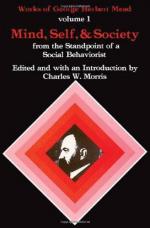|
This section contains 8,391 words (approx. 28 pages at 300 words per page) |

|
SOURCE: "Free Selves, Enriched Values, and Experimental Method: Mead's Pragmatic Synthesis," in International Philosophical Quarterly, Vol. XXXII, No. 1, March, 1992, pp. 79-93.
In the following essay, Rosenthal views the intertwining of Mead's notions of individuality, freedom, and creativity with biological activity and experimental method as imperative for a full understanding of his concept of self
The philosophy of G. H. Mead is firmly rooted within the mainstream of classical American pragmatism. He maintained an ongoing philosophic exchange with John Dewey over a period of many years, and as part of the Chicago school of pragmatism was influenced from various directions by scholars working in the context of this tradition. His appropriation of pragmatism, however, took it in new directions, and the originality of his ideas contributed greatly to its further development. His writings on the nature of the self have been an important focus of interest not just for...
|
This section contains 8,391 words (approx. 28 pages at 300 words per page) |

|


